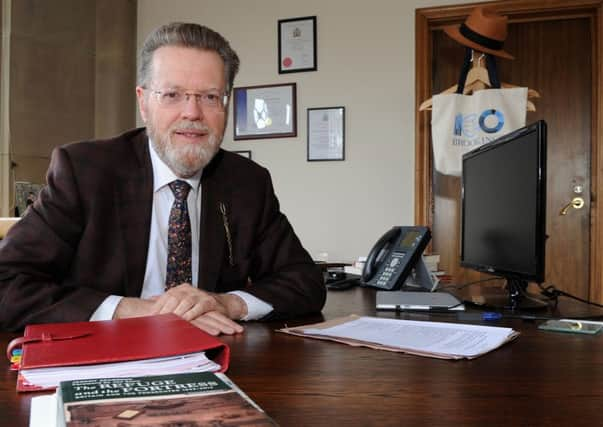Sir Keith Burnett: Brexit '“ societies that attack intellectuals come to harm


I am just a physicist who has spent my life working in an university.
I don’t have any more right to speak about politics than anyone else. I really do believe in democracy, even when it lets us do the daftest things.
Advertisement
Hide AdAdvertisement
Hide AdBut some are saying that academics think they are above ordinary people, and that is why many of us are whining so much about Brexit. These toffee-nosed members of the prosperous elite are complaining because think they should have been listened to more than the man and woman in the street. That we are bad losers, thinking we are so much better than our fellow citizens who disagreed with us. That isn’t it.
The really gutted academics are the ones being told the vote means they are not citizens at all. The ones who don’t know if they will have a future here once we leave the EU. They are about 15 per cent in my university overall, with a bigger percentage in language teaching, as you would expect.
But what about all the other “whining academics” – Brits who wanted to stay part of the Union? Doesn’t it “serve them right” for being out of touch with real people, and arrogant in thinking that they were right and Brexiters were wrong?
Again, it might be true that some of us are out of touch. After all, many people spend most of their time with their own work colleagues and neighbours, failing to understand the day-to-day reality of other lives. We wouldn’t be unique in that. But that it isn’t the reason people are so dismayed.
Advertisement
Hide AdAdvertisement
Hide AdThe people in academia that I meet are much more concerned with a whole range of practical matters that seem to be going pear shaped rather quickly.
If they were born in the UK, they still don’t want to lose their dear EU colleagues.
And they really don’t want to stop working with colleagues across the EU. The reason they feel so strongly is that the a great deal of important academic research is done in collaborations across Europe. Without the free movement of academics and students, this will switch off.
Others think we are just after money from the EU. And we do care about that, but not only for ourselves. EU money pays for scientific instruments and for clever students to do work with it. Money is not our main goal, it is what we need to fund the science.
Advertisement
Hide AdAdvertisement
Hide AdBut aren’t there some, like me, who don’t like hearing that we have got too big for our boots? Are we even verging on disloyalty to our country for daring to question the will of the people? Time to go back to our labs?
Well, I agree that we don’t need to listen to experts all of the time. We have no monopoly on truth. But we do need expertise sometimes, especially for things like treating diseases, work on encryption and cyber security, detecting gravitational waves from the cosmos, designing safe buildings, developing new solar cells and growing drought- resistant wheat.
This doesn’t make us any better than anybody else. But there is a lot of expertise we may need as citizens, and, in general terms, it is good to have clever people working on these things. The big fear is that the terms of Brexit – or the lack of clarity while we work out what these terms might be – could mean we lose what really matters by accident.
There is something else I’d add too. Not all academics are separate from the rest of society, hiding away in an ivory tower. Many are driven to help solve the injustices that ordinary people face.
Advertisement
Hide AdAdvertisement
Hide AdI know professors of engineering who have developed new programmes of apprenticeships which have given a real life chance and a job to young people in Rotherham.
I know law lecturers who offer free advice to small charities and experts in enterprise who have helped create the companies which have given employment to long-term homeless. Many of these people came from working class backgrounds themselves and they want to help the people they came from.
It isn’t just practical issues either. Our historians have an insight into how nations come together and how they separate. Political scientists and economists may well understand earlier than the average person the financial and political implications of our decision.
Remember, I, and most academics, really don’t think our ideas or votes are more important than any other persons. But if you voted Leave, you may have done so for what felt like the best of reasons. But that vote has released a tidal wave of challenges for me and my colleagues.
Advertisement
Hide AdAdvertisement
Hide AdWe are trying to save what our country will need. And just remember, societies that start attacking intellectuals usually end up in a bad way.
* Professor Sir Keith Burnett FRS is Vice-Chancellor of The University of Sheffield.